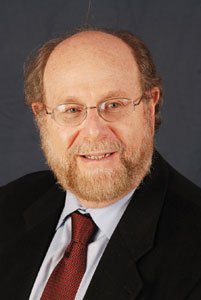 As the specialist and congregation consultant for the North American Reform movement in the program areas of caring community and family concerns, a major part of Rabbi Richard Address’s work has been in the development and implementation of the project on sacred aging. This project has been responsible for creating awareness and resources for congregations on the implication of the emerging longevity revolution with growing emphasis on the aging of the baby boom generation. This aging revolution has begun to impact all aspects of Jewish communal and congregational life.
As the specialist and congregation consultant for the North American Reform movement in the program areas of caring community and family concerns, a major part of Rabbi Richard Address’s work has been in the development and implementation of the project on sacred aging. This project has been responsible for creating awareness and resources for congregations on the implication of the emerging longevity revolution with growing emphasis on the aging of the baby boom generation. This aging revolution has begun to impact all aspects of Jewish communal and congregational life.
Rabbi Address will be in Kansas City on Thursday, May 5, to give a presentation titled, “To Honor and Respect.” It is one of three seminars being held in conjunction with Older Americans Month, co-sponsored by Jewish Family Services. (See below)
He said programs regarding sacred aging are necessary these days, pointing to the growing numbers of older adults. According to the Administration on Aging of the Department of Health and Human Services, 39.6 million people were 65 years or older in 2009. That represented 12.9 percent of the U.S. population. By 2030, the number of older Americans will grow to about 72.1 million older persons, which will make up about 19 percent of the population.
Rabbi Address said one of the most popular aspects of the sacred aging program the Reform movement has designed is caregiving and the impact it is having on the baby boomers. For that age group he has found, “if you aren’t doing this now, you have done it or you will do it. Everybody is going to get a turn at caregiving.”
He said the workshop, which is free and open to the Jewish and general communities, will focus on how classic Jewish texts guide and inform people on “the art of caregiving.”
“We’re really going to look at how we can approach, using the classic texts from the Bible, this whole phenomenon of caregiving. The title is based upon the quotation from the Torah, ‘to honor and respect,’” Rabbi Address said.
The greatest challenge to his work, he said, is getting out the information about how powerful the Jewish tradition is when it comes to sacred aging.
“Really in its ancientness it anticipates everything that people are going through,” said the Reform rabbi, who was here in November as a scholar in residence at Congregation Beth Torah.
One of the things Rabbi Address said he enjoys while he’s teaching about Jewish tradition and its approaches to caregiving is the opportunity to learn people’s stories.
Rabbi Address has some personal knowledge in the area of caregiving, as he has taken care of his mother, who now lives in a nursing home, for about 20 years. He’s learning that caregivers are tired, frustrated and stressed. As an example he explains a conversation he recently had with a man in his early 60s.
“He said, ‘This was supposed to be the time that I was supposed to have everything and now I’m working harder than I’ve ever worked before. I’m taking care of my 88-year-old parent. I’m heavily involved with my kids. I’m driving carpool for my grandchildren. This was supposed to be my time.’ ”
He said the seminar is geared toward people who are looking to find ways to “carve time out for me.” Many caregivers today, he said, are saying, “I’m losing part of myself in this.”
Along those same lines, Rabbi Address said caregivers are often faced with conflicts between caring for a loved one and caring for his or her own family.
“Who takes precedence between the person needing care and the demands of my husband, or my wife, or my children? A lot of times people feel they are being pulled in so many different directions and then they wonder, what about me? Who is taking care of me?”
The rabbi hopes this seminar will help people in these situations learn how they can take care of themselves spiritually.
Another point of discussion will be how roles can change once a caregiving situation arises.
“Sometimes you’re the daughter and sometimes you will be the parent. It’s an interesting dance,” he said. “There’s a real fine line of when you don’t take away someone’s dignity. There will be times that you may be put in the position that you may have to negotiate that dignity, which I am doing now with my mom in the nursing home, which is undignified. So many people are living it. And there is no right or wrong.”
He pointed out that there is no text book for people to follow, and the paths caregivers take are often very different. He gives the example of two friends.
“As they sit and discuss things over coffee, they will find that while their situations are similar they are radically different because there are different people involved, who bring to the table different universes and different experiences.”
May 2011 Older Americans Month
In honor of Older Americans Month KC4 Aging in Community, and its partner organizations, is sponsoring three events which are free and open to the community.
Caring for Your Family and Friends, featuring Rabbi Richard Address, will take place from 1 to 3 p.m. Thursday, May 5, at the Social Hall of the Jewish Community Campus.
A late afternoon seminar will also take place from 4 to 6 p.m. on May 5. The topic is Universal Design and it will be held in the LiveWise Renovations Showroom at 3500 W. 75th St., Suite 100, Prairie Village, Kan. 66211.
The topic is Mobility and Transportation from 9 a.m. to noon on Saturday, May 7. The seminar will be held at the Landon Center on Aging at KU Medical Center, 3901 Rainbow Dr., Kansas City, Kan. 66160.
The seminars are sponsored by KC4 Aging in Community, Jewish Family Services of Greater Kansas City, Theo and Alfred M. Landon Center on Aging, Mid-America Regional Council, Shepherd’s Center of KC Central, LifeWise Renovations and the American Red Cross. Reservations are requested but not required; e-mail or call (816) 979-1366.
 Readers of the Kansas City Jewish Chronicle, who present the ad on Page 6 of this week’s edition, will be able to view the “Diana, A Celebration” exhibit at Union Station for just $15 on Tuesdays, May 10 and May 17. Regular admission for the exhibit is $18-$23.50. The exhibit will be on display through June 12.
Readers of the Kansas City Jewish Chronicle, who present the ad on Page 6 of this week’s edition, will be able to view the “Diana, A Celebration” exhibit at Union Station for just $15 on Tuesdays, May 10 and May 17. Regular admission for the exhibit is $18-$23.50. The exhibit will be on display through June 12.


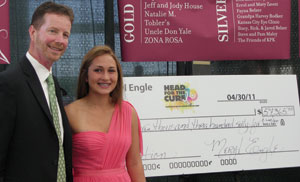 QUEEN OF GIVING — Nordaunian AZA held its annual Matzo Ball Saturday night. After being crowned queen in 2010, Meryl Engle dedicated her philanthropic efforts to Head for the Cure. She chose the charity because brain cancer was all too familiar to her and many of her friends. She worked with her uncle, Jim Engle, owner of James Engle Custom Homes, to build a house and donate the profits to HFTC. Meryl personally worked to engage a plethora of subcontractors to provide their services and supplies at no cost or at a reduced cost. In some cases, subcontractors even contributed a donation. During Saturday night’s festivities, she presented a check for $57,365 to HFTC. Meryl is the daughter of Teala and John Engle.
QUEEN OF GIVING — Nordaunian AZA held its annual Matzo Ball Saturday night. After being crowned queen in 2010, Meryl Engle dedicated her philanthropic efforts to Head for the Cure. She chose the charity because brain cancer was all too familiar to her and many of her friends. She worked with her uncle, Jim Engle, owner of James Engle Custom Homes, to build a house and donate the profits to HFTC. Meryl personally worked to engage a plethora of subcontractors to provide their services and supplies at no cost or at a reduced cost. In some cases, subcontractors even contributed a donation. During Saturday night’s festivities, she presented a check for $57,365 to HFTC. Meryl is the daughter of Teala and John Engle.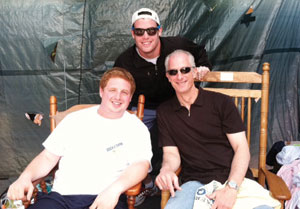 AEPi ROCK-A-THON — The Alpha Epsilon Pi Jewish fraternity at the University of Missouri-Columbia recently held its annual Rock-A-Thon raising more than $80,000 for The American Cancer Society. That’s the the largest amount raised by this bi-annual fundraiser to date. This year’s rocker, Lenny Goldman of Buffalo Grove, Ill., rocked for 63 consecutive hours. Kansas Citian Jeff Mallin was the fraternity’s rocker 30 years ago. In support of the event his mother, Beverly Mallin, quit smoking when her then college-age son stood up after completing the 63-hour-rocking-marathon. Jeff Mallin stopped by to support the event again this year and to visit his son and Beverly’s grandson, Zach, a freshman member of AEPi.
AEPi ROCK-A-THON — The Alpha Epsilon Pi Jewish fraternity at the University of Missouri-Columbia recently held its annual Rock-A-Thon raising more than $80,000 for The American Cancer Society. That’s the the largest amount raised by this bi-annual fundraiser to date. This year’s rocker, Lenny Goldman of Buffalo Grove, Ill., rocked for 63 consecutive hours. Kansas Citian Jeff Mallin was the fraternity’s rocker 30 years ago. In support of the event his mother, Beverly Mallin, quit smoking when her then college-age son stood up after completing the 63-hour-rocking-marathon. Jeff Mallin stopped by to support the event again this year and to visit his son and Beverly’s grandson, Zach, a freshman member of AEPi.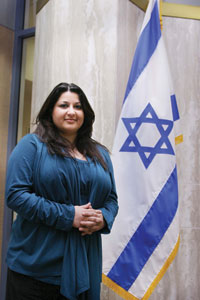 Jerusalem native Lilach Nissim arrived in Kansas City in early November as the Jewish Federation of Greater Kansas City’s fourth Israeli shlicha (Hebrew for female emissary). Her main job here is to educate Kansas Citians about Israel. Twice in the course of the next two weeks she’ll have a chance to give people a taste of Israel at citywide events — Yom HaAtzmaut (Israel Independence Day) and Yom HaZikaron (Israel’s Memorial Day).
Jerusalem native Lilach Nissim arrived in Kansas City in early November as the Jewish Federation of Greater Kansas City’s fourth Israeli shlicha (Hebrew for female emissary). Her main job here is to educate Kansas Citians about Israel. Twice in the course of the next two weeks she’ll have a chance to give people a taste of Israel at citywide events — Yom HaAtzmaut (Israel Independence Day) and Yom HaZikaron (Israel’s Memorial Day). As the specialist and congregation consultant for the North American Reform movement in the program areas of caring community and family concerns, a major part of Rabbi Richard Address’s work has been in the development and implementation of the project on sacred aging. This project has been responsible for creating awareness and resources for congregations on the implication of the emerging longevity revolution with growing emphasis on the aging of the baby boom generation. This aging revolution has begun to impact all aspects of Jewish communal and congregational life.
As the specialist and congregation consultant for the North American Reform movement in the program areas of caring community and family concerns, a major part of Rabbi Richard Address’s work has been in the development and implementation of the project on sacred aging. This project has been responsible for creating awareness and resources for congregations on the implication of the emerging longevity revolution with growing emphasis on the aging of the baby boom generation. This aging revolution has begun to impact all aspects of Jewish communal and congregational life.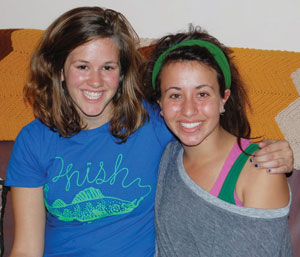 Alana Gaffen and Hannah Gortenburg met in kindergarten at the Hyman Brand Hebrew Academy. In third grade, they became friends and have been friends ever since. Now 19, they are both in Israel taking part in the The Young Judaea Year Course.
Alana Gaffen and Hannah Gortenburg met in kindergarten at the Hyman Brand Hebrew Academy. In third grade, they became friends and have been friends ever since. Now 19, they are both in Israel taking part in the The Young Judaea Year Course. DESCENDANTS OF WWII JEWISH VETERANS SOUGHT —The National World War I Museum at Liberty Memorial in Kansas City, Mo., is undertaking a search for family descendants to properly honor the 82 Kansas City-area World War II service members who gave their lives (this is separate from the Walk of Honor bricks for World War I vets). These servicemen were honored through dedication ceremonies from 1942 through 1949. New plaques are being issued to replace aging plaques. Five of the 83 servicemen honored are Jewish and museum officials are seeking their descendants so they can be invited to attend the dedication ceremony of the replacement plaques on Veterans Day 2011. They will also be able to keep their loved one’s original plaque if they wish. If any of our readers are descendants or know of descendants of these five men, which includes children, grandchildren, nieces, nephews, cousins, etc., please call Patrick Raymond at (816) 784-1913:
DESCENDANTS OF WWII JEWISH VETERANS SOUGHT —The National World War I Museum at Liberty Memorial in Kansas City, Mo., is undertaking a search for family descendants to properly honor the 82 Kansas City-area World War II service members who gave their lives (this is separate from the Walk of Honor bricks for World War I vets). These servicemen were honored through dedication ceremonies from 1942 through 1949. New plaques are being issued to replace aging plaques. Five of the 83 servicemen honored are Jewish and museum officials are seeking their descendants so they can be invited to attend the dedication ceremony of the replacement plaques on Veterans Day 2011. They will also be able to keep their loved one’s original plaque if they wish. If any of our readers are descendants or know of descendants of these five men, which includes children, grandchildren, nieces, nephews, cousins, etc., please call Patrick Raymond at (816) 784-1913: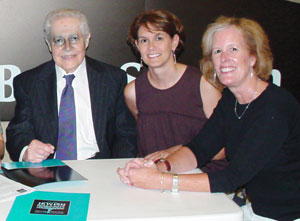 The Jewish Community Foundation of Greater Kansas City is one of the nation’s leaders when it comes to working with community organizations to give them the tools for creating endowments through planned giving. As such, it will be hosting the Jewish Legacy Forum May 3, 4 and 5. Approximately 30 Jewish communities will be represented, bringing to Kansas City more than 80 people — both professionals and lay leaders — who work with Jewish federations or Jewish community foundations in North America.
The Jewish Community Foundation of Greater Kansas City is one of the nation’s leaders when it comes to working with community organizations to give them the tools for creating endowments through planned giving. As such, it will be hosting the Jewish Legacy Forum May 3, 4 and 5. Approximately 30 Jewish communities will be represented, bringing to Kansas City more than 80 people — both professionals and lay leaders — who work with Jewish federations or Jewish community foundations in North America.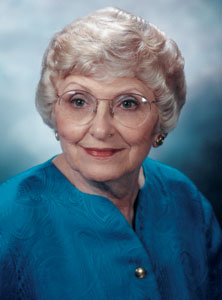 Grace Day has been a pioneer for women lawyers. She was the only woman in her class when she earned her Juris Doctor degree from the University of South Dakota in 1949. In 1972 she was the first woman president of the St. Joseph, Mo., Bar Association. Next week she will be presented with the Woman of the Year award by Missouri Lawyers Weeky. The 13th Annual Women’s Justice Awards, which honors 35 female attorneys in Missouri, will be held in St. Louis on Wednesday, April 27.
Grace Day has been a pioneer for women lawyers. She was the only woman in her class when she earned her Juris Doctor degree from the University of South Dakota in 1949. In 1972 she was the first woman president of the St. Joseph, Mo., Bar Association. Next week she will be presented with the Woman of the Year award by Missouri Lawyers Weeky. The 13th Annual Women’s Justice Awards, which honors 35 female attorneys in Missouri, will be held in St. Louis on Wednesday, April 27. Eileen Garry, executive director of The Kansas City Jewish Museum of Contemporary Art (KCJMCA) since 2000, has announced plans to retire at the start of 2012. This year KCJMCA has been celebrating its 20th anniversary, and Garry has been involved since its inception in 1992. She began her association with KCJMCA as a Kansas City Jewish Museum Foundation founding member, then served as a volunteer assistant director before becoming its executive director.
Eileen Garry, executive director of The Kansas City Jewish Museum of Contemporary Art (KCJMCA) since 2000, has announced plans to retire at the start of 2012. This year KCJMCA has been celebrating its 20th anniversary, and Garry has been involved since its inception in 1992. She began her association with KCJMCA as a Kansas City Jewish Museum Foundation founding member, then served as a volunteer assistant director before becoming its executive director.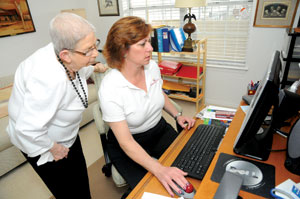 What do you do if Mom, Dad or Aunt Zelda needs an extra hand or a ride and you aren’t able to provide it? You can call Seniors Helping Seniors, a new area business that specializes in providing non-medical services for seniors by seniors.
What do you do if Mom, Dad or Aunt Zelda needs an extra hand or a ride and you aren’t able to provide it? You can call Seniors Helping Seniors, a new area business that specializes in providing non-medical services for seniors by seniors.